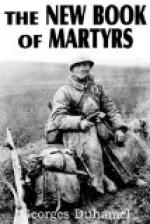“What I shall want is not a sole, but a little bench.”
But Carre is ill, terribly ill.
That valiant soul of his seems destined to be left alone, for all else is failing.
He had one sound leg. Now it is stiff and swollen.
He had healthy, vigorous arms. Now one of them is covered with abscesses.
The joy of breathing no longer exists for Carre, for his cough shakes him savagely in his bed.
The back, by means of which we rest, has also betrayed him. Here and there it is ulcerated; for man was not meant to lie perpetually on his back, but only to lie and sleep on it after a day of toil.
For man was not really intended to suffer with his miserable, faithless body!
And his heart beats laboriously.
There was mischief in the bowel too. So much so, that one day Carre was unable to control himself, before a good many people who had come in.
In spite of our care, in spite of our friendly assurances, Carre was so ashamed that he wept. He who always said that a man ought not to cry, he who never shed a tear in the most atrocious suffering, sobbed with shame on account of this accident. And I could not console him.
He no longer listens to all we say to him. He no longer answers our questions. He has mysterious fits of absence.
He who was so dignified in his language, expresses himself and complains with the words of a child.
Sometimes he comes up out of the depths and speaks.
He talks of death with an imaginative lucidity which sounds like actual experience.
Sometimes he sees it ... And as he gazes, his pupils suddenly distend.
But he will not, he cannot make up his mind....
He wants to suffer a little longer.
I draw near to his bed in the gathering darkness. His breathing is so light that suddenly, I stop and listen open-mouthed, full of anxiety.
Then Carre suddenly opens his eyes.
Will he sigh and groan? No. He smiles and says:
“What white teeth you have!”
Then he dreams, as if he were dying.
Could you have imagined such a martyrdom, my brother, when you were driving the plough into your little plot of brown earth?
Here you are, enduring a death-agony of five months swathed in these livid wrappings, without even the rewards that are given to others.
Your breast, your shroud must be bare of even the humblest of the rewards of valour, Carre.
It was written that you should suffer without purpose and without hope.
But I will not let all your sufferings be lost in the abyss. And so I record them thus at length.
Lerondeau has been brought down into the garden. I find him there, stretched out on a cane chair, with a little kepi pulled down over his eyes, to shade them from the first spring sunshine.
He talks a little, smokes a good deal, and laughs more.




